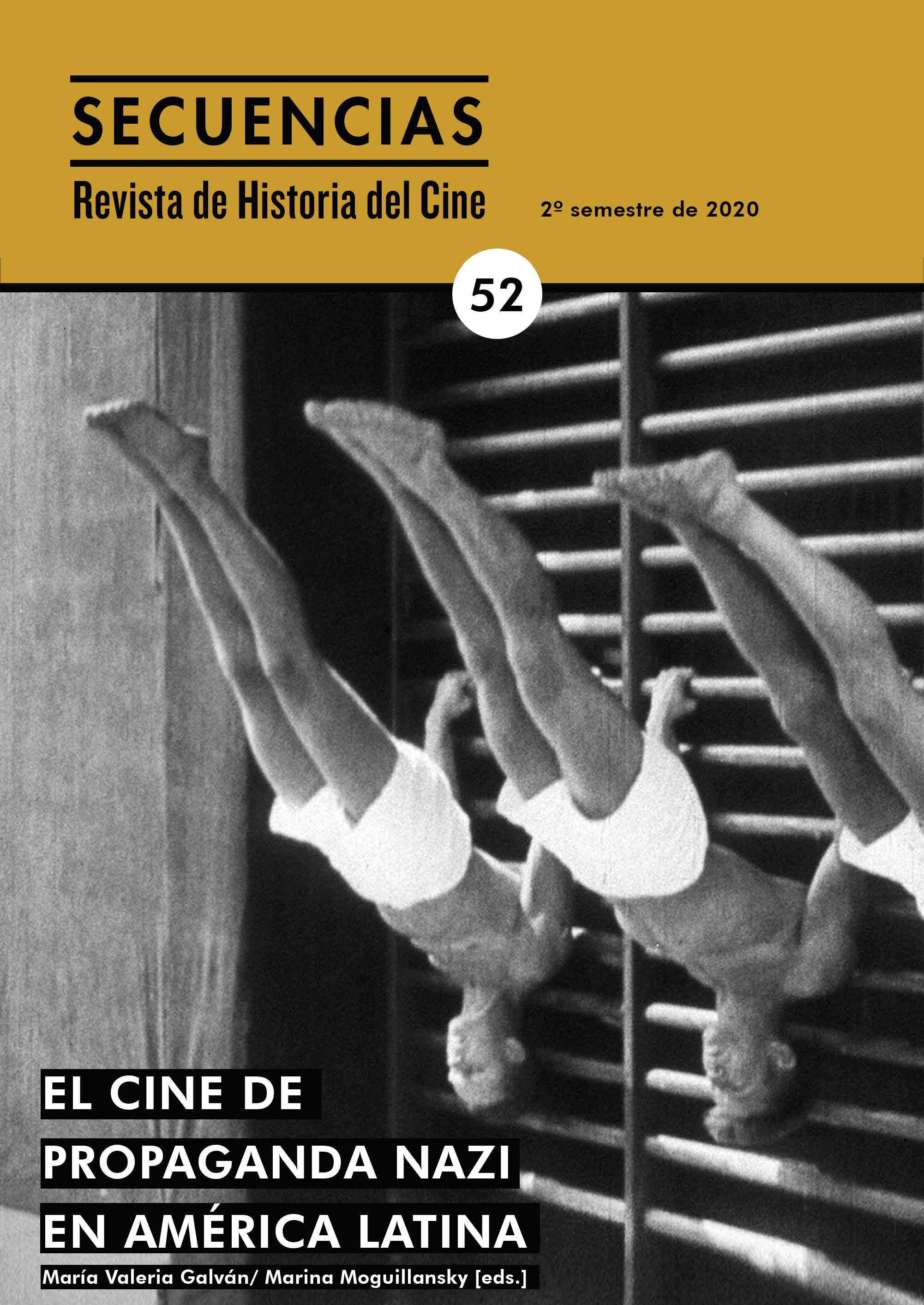Transpositions between Literature and Cinema: Latin America in the German Imperialist Imaginary, 1890-1945
Keywords:
Popular novels, adventures cinema, Nazism, exotic, living place
This work is licensed under a Creative Commons Attribution 3.0 Unported License.
Abstract
This article studies how images and texts were circulated in the media in Germany’s Wilhelmine
era, the Weimar Republic and the Nazi period, based on a number of foundational literary
myths. Among the latter, we focus particularly on the trope of the German migrant and his
encounter with the exotic. We will begin by looking at the narrative focus of several novels
written for popular entertainment (or Trivialliteratur) and which take place in Latin America or
Africa. These regions are signified as ‘empty territory’, as places to be explored by migrants of
German origin who go in search of broader horizons to inhabit (Lebensraum). We then move on
to look at how the same themes are transposed to national socialist cinema. These are images
that, appropriating both adventure novels and its public, make use of the figure of the migrant,
now understood as the «German living abroad» (Auslandsdeutsche), a hero in exile, as well as
the notion of the exotic, as a space with no rights. Their objective is to generate, at an affective
level, resentment over defeat and the sacralization of revenge
Downloads
References
ADORNO, T., y HORKHEIMER, M., Dialética do esclarecimento. (Rio de Janeiro, Zahar, 1985).
ANSART, P., «História e memória dos ressentimentos», en M. Bresciani y M. Naxara (orgs), Memória e ressentimento; indagações sobre uma questão sensível (Campinas, Editora da UNICAMP, 2004), p. 15-36.
ARENDT, H., O sistema totalitário (Lisboa, Dom Quixote, 1978).
BREPOHL, M., Imaginação literária e política; os alemães e o imperialismo (Uberlândia, Editora UFU, 2010).
BREPOHL, M., Pangermanismo e nazismo; a trajetória alemã rumo ao Brasil (Curitiba, SAMP, 2014).
BREPOHL, M., «Dever de memória e colonialidade: a invisibilidade dos subalternos», en M. Gonçalves y M. Brepohl, Políticas de memória e experiências de (des)exílio (Curitiba, Editora da UFPR, 2017).
COUTARDE, F. y CADARS, P. Histoire du cinéma nazi (Paris, Eric Losfeld, 1972).
D´EL REI, P., Maria Kahle (1891-1975): vida e obra (São Paulo, Instituto Martius-Staden, 2014). Disponible en :
<http://www.martiusstaden.org.br/conteudo/detalhe/135/maria-kahle-1891-1975-vida-e-obra> (15/04/2019)
DÖBLIN, A., Amazonas Trilogie (Munich, Deutsches Taschenbuch, 1991).
KORFMAN, M. & MENEGUZZO, R., «Encenações autorais e textuais em Karl May»
(Pandaemonium ger. vol. 20 n.º 31, São Paulo, julio/agosto, 2017).
GLÜSING, J., Das Guyana-Projekt (Berlin, Ch. Links, 2008).
KRACHENSKI STADLER, N., Em busca das colônias perdidas; a visualidade da propaganda do Movimento Neocolonial Alemão (1925-1943) (Tesis de Máster, Curitiba, Universidade Federal do Paraná, 2015).
NEBE, A., «Das Spiel ist aus» (Der Spiegel, 9/02/1950). <https://www.spiegel.de/spiegel/print/d-44446464.html> (12/09/2019.)
OLDEN, B., Paradiese des Teufels; biographisches und autobiographisches Schriften und Briefen aus dem Exil (Berlin, Rüten& Loening, 1977).
PEREIRA, W., O império das imagens de Hitler: O projeto de expansão internacional do modelo nazi-fascista na Europa e na América Latina; 1933-1955 (Tesis doctoral, São Paulo, Universidade de São Paulo, 2008)
SCHMITT, C., El nomos de la tierra (Buenos Aires, Ed. Struhart, 2005).
SNYDER, L., Macro Nationalisms. A History of the Pan-movements (Londres, Greenwood Press, 1985).
UEDING, R., Karl May Handbuch (Stuttgart, Alfred Kröwer Verlag, 1987).
STEINMETZ, G. y HELL, J., «The Visual Archive of Colonialism: Germany and Namibia» (Public Culture, 18 (1), 2006), p. 132-149.

